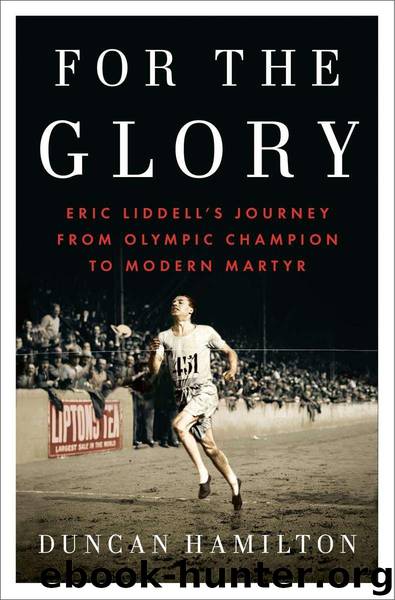For the Glory: Eric Liddell's Journey from Olympic Champion to Modern Martyr by Duncan Hamilton

Author:Duncan Hamilton
Language: eng
Format: mobi, epub
Publisher: Penguin Publishing Group
Published: 2016-05-09T16:00:00+00:00
CHAPTER TWELVE
THE SHARPEST EDGE OF THE SWORD
COUNTRY EVANGELISM was Eric Liddell’s forte. He had been born for it. Within six months, after his Chinese began to improve markedly, he was certain that leaving Tientsin for Siaochang had been a “destiny-fulfilling” decision for him after all. Once asked outright by the inquisitive Annie Buchan whether he ever regretted his move, Liddell replied, “Never,” and then explained why. “I have more joy and freedom in the work than I have ever experienced before.” Liddell said it was “wonderful to feel one with the people.” Florence Liddell saw the change in her husband. “It was quite obvious he did the right thing,” she said. “He loved the work . . . and I think he blossomed out in a new way.”
Liddell considered the Chinese to be “calm, patient, willing to suffer a great deal with very little complaining and content with very little.” He could have been describing himself as well. Predictably he became confidant, comforter, grief counselor, social worker, diplomat, and problem solver in Siaochang—inside as well as outside its walls. If there was a quarrel, he was “used as a buffer,” recalled Buchan, whose initial skepticism about whether Liddell could transform himself from classroom teacher to missionary quickly passed. To the Chinese, who looked on him so fondly, he became Li Mu Shi: Pastor Liddell. When any decision had to be reached—and especially if it was likely to stir controversy or required mediation—Buchan would hear someone say: “Ask Li Mu Shi what he thinks about it.” The preachers, the nurses, the students, and the Chinese “hung on his words,” she added.
His surname gave him an advantage among the locals that was denied to other missionaries. He wasn’t a stranger to them. As Buchan pointed out, Liddell’s father, James, was “still revered and loved” in Siaochang. The children James Liddell had known now had children and grandchildren of their own and remembered his kindnesses and also his fierce commitment to China. Liddell never spoke to them about being an Olympic champion. There was no point. No one in the outback of Siaochang had any concept of the Games and its ribboned gold medals. His prestige came from his lineage. To talk about his father was like presenting an impeccable character reference. There was an instant connection, which brought an instant trust, because stories could be swapped about a shared past.
Buchan also said Liddell possessed his father’s “winning personality” and was always thorough and organizationally innovative in his work. He drew maps of the area because none except the most rudimentary had previously existed. These highlighted safe shortcuts that ducked away from known Japanese patrols. According to Buchan, he compiled charts and schedules too, which enabled him to “systematically” visit churches and regularly hold meetings in them. No one in his parish felt neglected. Space was created in his diary for ordinary house calls, dropping in on parishioners to whom, Buchan insisted, “he never expounded elaborate theories but suggested the possibility of a way of life that was Bible-based and God-governed.
Download
For the Glory: Eric Liddell's Journey from Olympic Champion to Modern Martyr by Duncan Hamilton.epub
This site does not store any files on its server. We only index and link to content provided by other sites. Please contact the content providers to delete copyright contents if any and email us, we'll remove relevant links or contents immediately.
Shoe Dog by Phil Knight(5257)
The Rules Do Not Apply by Ariel Levy(4957)
Walking by Henry David Thoreau(3953)
How to Read Water: Clues and Patterns from Puddles to the Sea (Natural Navigation) by Tristan Gooley(3460)
Running Barefoot by Amy Harmon(3445)
I'll Give You the Sun by Jandy Nelson(3428)
Crazy Is My Superpower by A.J. Mendez Brooks(3398)
How to Read Nature by Tristan Gooley(3335)
How Music Works by David Byrne(3259)
The Boy, the Mole, the Fox and the Horse by Charlie Mackesy(3113)
The Fight by Norman Mailer(2927)
Seducing Cinderella by Gina L. Maxwell(2640)
Cuba by Lonely Planet(2629)
Accepted by Pat Patterson(2364)
Going Long by Editors of Runner's World(2356)
The Unfettered Mind: Writings from a Zen Master to a Master Swordsman by Takuan Soho(2306)
Backpacker the Complete Guide to Backpacking by Backpacker Magazine(2241)
The Happy Runner by David Roche(2233)
Trail Magic by Trevelyan Quest Edwards & Hazel Edwards(2177)
